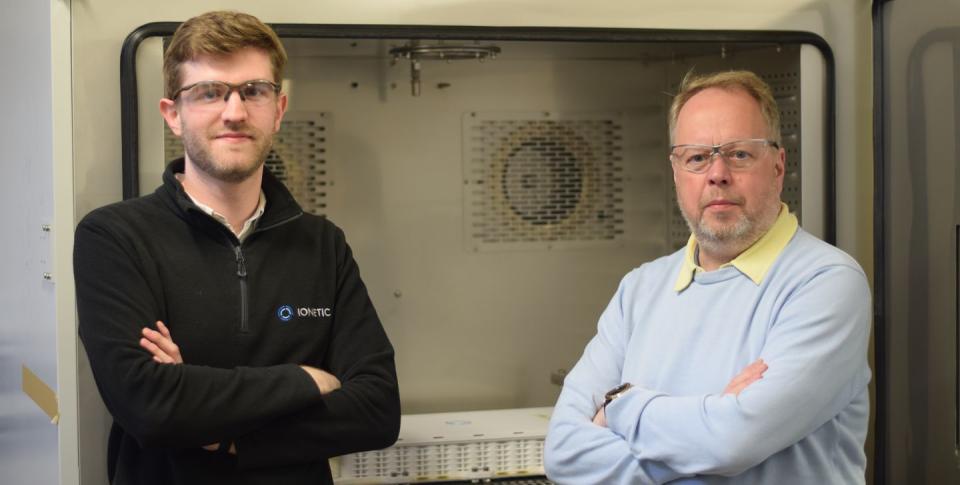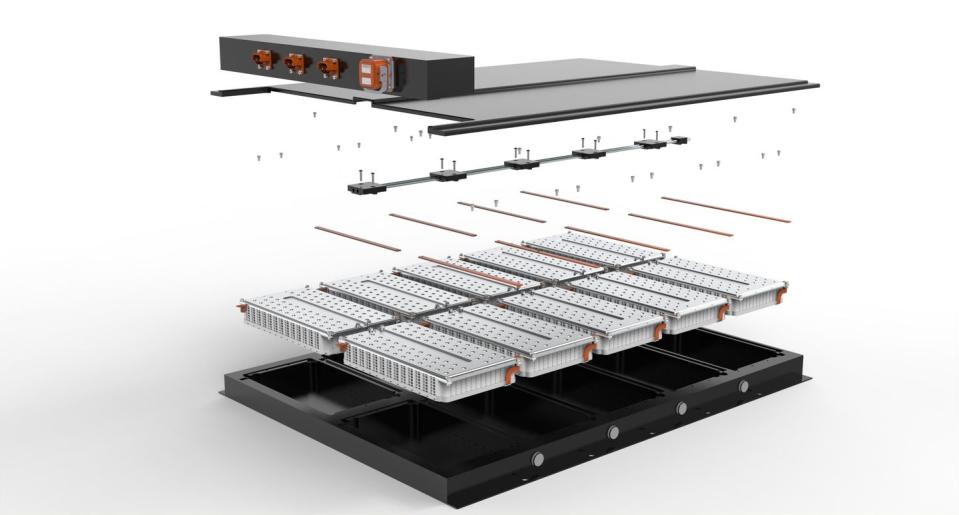Ex-Aston Martin CEO Is Now Chairman of This Startup

Andy Palmer (at right, next to Ionetic CEO James Eaton) joins UK-based EV battery pack startup Ionetic as chairman, following years at Nissan and Aston Martin.
The company is developing battery packs of its own design that are promised to offer higher energy density and greater space optimization, with plans to offer them to low-volume vehicle manufacturers that are turning to EVs.
At Nissan, Palmer, an engineer by training, led the team that developed the Leaf, giving him unique insight into EV program planning and manufacturing.
In the world of sports cars Andy Palmer is best known as the CEO of Aston Martin for much of the past decade, overseeing the launch of four new model lines in a short span of time, including the DBX. But in the world of EVs, Palmer is perhaps best known for leading development of the Nissan Leaf, playing a key role in the automaker's early embrace of electric cars.
The Englishman has had a much more eclectic career than many other car company execs, working on transmissions at the Rover Group early in his career before moving to Nissan and rising to the rank of chief planning officer. A quarter-century at Nissan preceded his turn behind the wheel at Aston Martin in the 2010s, but it is his experience with EV tech that played a role in his most recent appointment as chairman at Ionetic, a UK startup focusing on EV battery pack technology.
At the moment the company is advancing toward launching its first giga-scale manufacturing plant in the UK, promising a state-of-the-art EV battery pack design platform.
"Fully customized designs are often unaffordable, while existing off-the-shelf battery pack solutions suffer from low energy density and poor optimization," Ionetic says. "This is particularly true for lower volume niche automotive manufacturers with unique requirements."
For automakers, Ionetic promises a battery pack platform that can increase energy density by 30%, in addition to improving the utilization of battery pack volume by up to 120%. The startup plans to begin pilot production of its own battery pack this year, seeking to offer automakers an alternative to off-the-shelf units that are often not well suited to a variety of EVs.

"There are many stages needed to get a battery pack into production. Automotive companies need to consider requirements, system design, homologation, embedded control, manufacturing options, and vehicle integration, to name a few," says James Eaton, CEO and Co-Founder of the startup. "These stages are often done by different companies, which can lead to a costly, fragmented process. At Ionetic we facilitate all these stages, simplifying the process and reducing the cost for EV OEMs."
Ionetic plans first to focus on relatively niche EV makers as its customers, the kind that might not meet the minimum order requirements of large battery pack suppliers. Bus and truck manufacturers with EV models in their lineups are exactly the type of companies Eaton is talking about, which at the moment produce far below 10,000 EVs a year. As these manufacturers move to electrify their fleets, Ionetic hopes to supply them with its unique battery pack designs.
But Eaton also sees Ionetic's battery pack solutions as a lifeline to smaller automakers that might otherwise not survive the industry-wide turn to electrification, which is now looming in Europe as regulations and ZEV targets solidify. This includes Europe's low-volume sports car cottage industry, or what's left of it.
This is where Palmer's experience in leading the Leaf program at Nissan will play a role.
"I have witnessed first-hand the need for more cost-effective battery pack solutions that can still meet the performance criteria of automotive OEMs, especially in lower volume," Palmer said. "Ionetic is doing just this, and I have great belief that its offering will significantly reduce the challenge and headaches of electrification for OEMs. I look forward to working with James and his brilliant team whilst using my experience to further develop their solution and take the business to the next level."
Palmer's appointment as chairman comes at a time when a number of sports car makers are on the verge of rolling out their first electric models, including Maserati and Lotus. But while these two automakers have larger corporate parents backing them, the same is not necessarily true for smaller automakers, or the builders of specialty commercial vehicles that will also have to comply with the EU's 2035 ZEV goal. This is Ionetic's target audience.

 Yahoo Autos
Yahoo Autos 